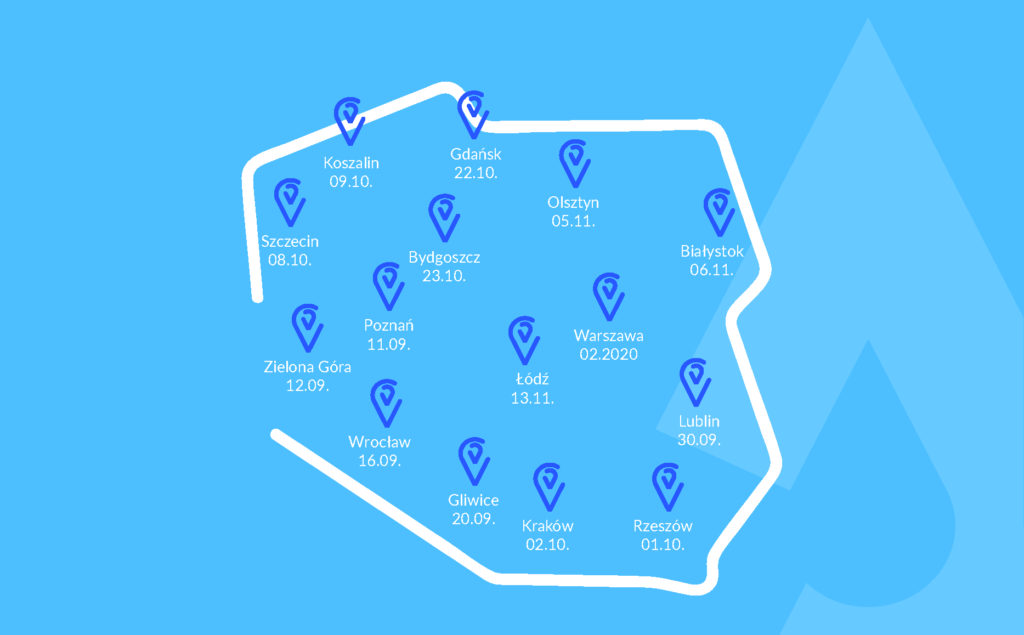By publishing the video “Stop suszy” (Stop the Drought), we intend to initiate a public discussion about drought in Poland. We have scrutinised the phenomenon with the help of the research conducted for the purposes of the “Stop the Drought!” programme. The video, owing its title to the programme itself, aims to draw attention to the growing problem.
You can watch the video on Facebook and the Wody Polskie Youtube channel: https://www.youtube.com/watch?v=8D5f12dfbZQ&t=2s
The situation is serious since Poland is one of the countries with the scarcest water resources in the European Union. During a drought period, there is only 1000 m3 of water per one Polish citizen per annum. It is up to four times less than in other EU countries! The situation is also aggravated by the climate change we have observed in recent years. Alternate heavy rainfalls and drought periods are dangerous to people, economy, and the environment. They constitute a challenge for the water economy of our times.
The answer to both drought and flood is retention. Large water reservoirs alleviate the situation in entire regions. They stabilise water levels in rivers and help regain their natural biological flow. They also maintain ground water levels. Such efforts are envisioned to be carried out over many years to come.
The Retention Development Programme, initiated by the Polish Ministry of Maritime Economy and Inland Navigation, encompasses 94 investments implemented by Wody Polskie until 2027, with an option of extension to 2030. Building 30 new water reservoirs (including nine large ones) is among the enterprises planned. PLN 14 billion will be spent on retention-related investments. Thanks to the multi-annual plan, the funds will be used as early as this year.
In order to fight drought and flood, extensive measures ought to be undertaken in both the so-called “small retention” and “big retention” (water retention in large reservoirs). Smaller retention basins, lakes, and ponds are the means of aiding water balance at a local level. Wastelands afforestation and the restoration of wetland areas are also helpful. Implementing blue-green infrastructure in cities is vital as well. Nowadays, vast areas covered with asphalt and concrete are a significant problem in urban areas. During heavy rainfalls, rising water is often the cause of local flooding. Then it quickly “escapes”, which is likely to cause earth to dry out instantly and, as a result, leads to drought. It is necessary to take measures aimed at preventing such phenomena. The improvement of soil retention is also an important objective in agriculture. The comprehensive plans to prevent drought put emphasis particularly on implementing the right solutions in agriculture, such as land amelioration systems for drainage and irrigation, which both drain the excess rainwater and store it for drought. At a household level, “micro-retention” is worth opting for; for instance, you could give up watering your lawn copiously for keeping a wildflower meadow, which is capable of preserving moisture for longer.
It is also crucial to increase public awareness when it comes to water. High quality drinking water need not be used for everything. Gardens can be watered with rainwater. This solution is good for your wallet and the environment. With the educational campaign “Stop the Drought!”, we also draw attention to the issue of food waste. Throwing out groceries is a waste of hundreds of litres of water used in the production process. For example, a loaf of bread which ends up in a bin equals as much as 400 litres of wasted water.
Therefore, water should be managed sustainably at a household, commune, and country level.
The “Stop the Drought!” programme, carried out by Wody Polskie, and the Retention Development Programme, initiated by the Ministry of Maritime Economy and Inland Navigation, tackle the issue of water management in comprehensive ways. Both enterprises complement one another.
The Minister of Maritime Economy and Inland Navigation has announced public consultations that are to be held over the course of six months in 15 cities in Poland. They start in August 2019 and finish in February 2020. During the meetings, a project to implement the first plan in Poland to counteract the effects of drought (Polish: Plan przeciwdziałania skutkom suszy; PPSS) will be presented. The plan, along with water management plans, flood risk management plans, and water maintenance plans, is meant to contribute to the improvement of the state of water economy in Poland. The PPSS will be adopted by the decree of the minister in charge of economy. It is predicted that the work on the plan will have been finished by the end of 2020. Poland is one of ten European countries with a plan drawn up to counteract the effects of drought. Such documents have been drafted in Great Britain, France, Italy, Spain, Portugal, Slovakia, Czechia, Hungary, and Ukraine.
See the map of public consultations regarding the PPSS project below:




Thanks for another informative site. Where else may I am getting that kind of information written in such
a perfect approach? I have a venture that I am just now
running on, and I’ve been at the look out for such info.
If some one wants to be updated with most up-to-date technologies afterward he must be
visit this web page and be up to date everyday.
This page definitely has all the info I wanted about this subject and didn’t know who to
ask.
I’m not sure why but this web site is loading incredibly slow for me.
Is anyone else having this issue or is it a problem on my end?
I’ll check back later on and see if the problem still exists.
I enjoy looking through a post that will make people think.
Also, thank you for permitting me to comment!
Hello there, just became aware of your blog through Google, and found that it is really informative.
I’m going to watch out for brussels. I’ll be grateful if you continue this in future.
Numerous people will be benefited from your writing.
Cheers! Escape room lista
I like this web site it’s a master piece! Glad I observed this on google..
After looking over a number of the blog posts on your blog, I seriously like your way of writing a blog. I book-marked it to my bookmark website list and will be checking back soon. Please visit my web site as well and let me know what you think.
Very good article. I’m going through many of these issues as well..
Hi there! This article couldn’t be written much better! Reading through this article reminds me of my previous roommate! He constantly kept preaching about this. I will send this information to him. Fairly certain he’ll have a very good read. I appreciate you for sharing!
Good post. I learn something new and challenging on blogs I stumbleupon every day. It’s always exciting to read through content from other authors and use a little something from other sites.